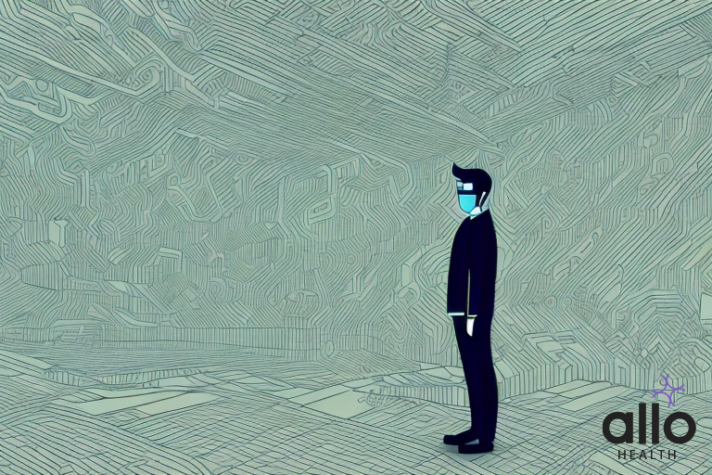How Narcissistic Abuse Can Lead to Erectile Dysfunction

"The following blog article provides general information and insights on various topics. However, it is important to note that the information presented is not intended as professional advice in any specific field or area. The content of this blog is for general educational and informational purposes only.
Book consultation
The content should not be interpreted as endorsement, recommendation, or guarantee of any product, service, or information mentioned. Readers are solely responsible for the decisions and actions they take based on the information provided in this blog. It is essential to exercise individual judgment, critical thinking, and personal responsibility when applying or implementing any information or suggestions discussed in the blog."
 Are you struggling with erectile dysfunction? If you’ve been a victim of narcissistic abuse, you may be surprised to learn that there could be a connection between the two. Narcissistic abuse can take a severe toll on a person’s emotional, mental, and physical well-being, and one area that may be particularly affected is men’s sexual health.
Are you struggling with erectile dysfunction? If you’ve been a victim of narcissistic abuse, you may be surprised to learn that there could be a connection between the two. Narcissistic abuse can take a severe toll on a person’s emotional, mental, and physical well-being, and one area that may be particularly affected is men’s sexual health.
Understanding Narcissistic Abuse and Its Impact on Men’s Health
Narcissistic abuse is a destructive, manipulative behavior pattern that is characterized by a lack of empathy and an excessive focus on one’s own needs and desires. Men who have been victimized by narcissistic abuse may experience a range of negative health effects. These might include depression, anxiety, insomnia, and chronic stress. Sadly, victims of narcissistic abuse may also face the additional burden of erectile dysfunction.
Furthermore, narcissistic abuse can also lead to physical health problems such as high blood pressure, heart disease, and gastrointestinal issues. This is because the constant stress and anxiety caused by the abuse can take a toll on the body’s immune system and overall health.
It is important for men who have experienced narcissistic abuse to seek professional help and support. Therapy and counseling can help victims process their trauma and develop coping mechanisms to manage the negative effects on their health and well-being. Additionally, support groups and online communities can provide a safe space for men to connect with others who have gone through similar experiences and find comfort in knowing they are not alone.
The Connection Between Narcissistic Abuse, Trauma, and Erectile Dysfunction
Narcissistic abuse can create a significant emotional trauma for its victims. Trauma can interfere with a person’s mental and physical well-being, including a man’s ability to achieve and maintain erections. According to a recent study published in the American Journal of Men’s Health, erectile dysfunction is more prevalent in men who have experienced emotional abuse or trauma. It’s no surprise, then, that the combination of narcissistic abuse and the trauma it generates can be a recipe for sexual dysfunction.
Furthermore, the effects of narcissistic abuse and trauma can extend beyond just erectile dysfunction. Victims may also experience a decrease in libido, difficulty reaching orgasm, and even pain during sexual activity. These issues can further exacerbate the emotional trauma and lead to a negative impact on the victim’s overall quality of life.
It’s important for victims of narcissistic abuse to seek professional help to address the trauma they have experienced. Therapy and counseling can help individuals work through their emotional pain and begin to heal. Additionally, seeking medical treatment for sexual dysfunction can also be beneficial in improving sexual function and overall well-being.
Signs and Symptoms of Narcissistic Abuse-Induced Erectile Dysfunction
Men who suffer from narcissistic abuse-induced erectile dysfunction may experience a range of symptoms. These could include trouble achieving or maintaining an erection, difficulty becoming aroused, and a loss of sexual desire. It’s essential to note that these symptoms are not always easy to identify as connected to narcissistic abuse since the victim might not realize the impact of their trauma on their sexual health. However, it’s essential to start examining the possibility that this link might exist.
In addition to the above symptoms, men who suffer from narcissistic abuse-induced erectile dysfunction may also experience feelings of shame, guilt, and anxiety related to their sexual performance. They may avoid sexual encounters altogether, leading to further strain on their relationships. It’s crucial for individuals experiencing these symptoms to seek professional help and support to address the underlying trauma and improve their sexual health.
The Psychological Effects of Narcissistic Abuse on Men’s Sexual Health
The psychological effects of narcissistic abuse can run deep. Men may experience a range of negative feelings about their sexuality, including shame, guilt, and a sense of inadequacy. These feelings can compound the effects of the trauma and ultimately impact sexual performance and function. It’s common for men who have suffered from narcissistic abuse to develop feelings of fear or anxiety towards sex, and this can be a significant hurdle to overcome when it comes to addressing erectile dysfunction.
In addition to the emotional impact, narcissistic abuse can also have physical effects on men’s sexual health. Men who have experienced narcissistic abuse may be more likely to engage in risky sexual behaviors, such as unprotected sex or sex with multiple partners, as a way to cope with their trauma. This can increase their risk of contracting sexually transmitted infections and other health issues. It’s important for men who have experienced narcissistic abuse to seek support and therapy to address both the emotional and physical effects of the trauma on their sexual health.
Coping with Erectile Dysfunction Caused by Narcissistic Abuse: Tips and Strategies
If you’re struggling with erectile dysfunction, know that you’re not alone. Many men experience this challenging issue and have found ways to cope and recover. Here are some tips and strategies that might help:
- Get Support – Talking to someone you trust can be helpful when dealing with the emotional impact of narcissistic abuse-induced erectile dysfunction.
- Recognize and Address Trauma – Working with a therapist who specializes in trauma can be a helpful step in improving your sexual health.
- Make Healthy Lifestyle Choices – Eating a balanced diet, getting enough exercise, and avoiding alcohol and drugs can improve your overall health and sexual function.
- Consider Medications – Erectile dysfunction medications can be effective for many men. Talk to your doctor about options that may be right for you.
It’s important to note that healing from narcissistic abuse can be a long and difficult process, and it’s okay to take time to focus on your own well-being. In addition to seeking professional help, practicing self-care and self-compassion can also be beneficial. This may include activities such as meditation, journaling, or spending time in nature. Remember that recovery is possible, and taking steps towards healing can lead to a healthier and happier life.
How to Seek Help for Narcissistic Abuse-Related Erectile Dysfunction
If you’re struggling with erectile dysfunction and believe it might be linked to narcissistic abuse, seeking help is essential. Talk to your doctor, a therapist or counselor who specializes in trauma and abuse. They can assist you in identifying the root cause of your sexual dysfunction and help you develop strategies to manage it effectively.
It’s important to remember that seeking help for narcissistic abuse-related erectile dysfunction can be a difficult and emotional process. It’s okay to take your time and find a therapist or counselor who you feel comfortable with and who understands your unique situation. Additionally, there are support groups and online communities available where you can connect with others who have experienced similar issues and find additional resources and guidance.
Overcoming Stigma: Addressing the Link Between Narcissistic Abuse and Erectile Dysfunction
While there’s increased awareness of narcissistic abuse and the trauma it creates, there’s still a stigma around discussing sexual dysfunction openly. It’s essential to recognize that ED is a common condition that affects many men and can be caused by a wide range of factors, including narcissistic abuse. Talking openly about the connection between these two issues can help reduce the sense of shame and stigma that some men may feel.
It’s important to note that narcissistic abuse can have long-lasting effects on a person’s mental and physical health. In addition to ED, survivors may experience anxiety, depression, and other physical symptoms such as chronic pain and digestive issues. Seeking professional help and support from loved ones can be crucial in the healing process.
Furthermore, it’s important to educate oneself on the signs of narcissistic abuse and how to recognize it in a relationship. This can help prevent further harm and allow individuals to seek help sooner. By breaking the silence and addressing the link between narcissistic abuse and ED, we can work towards creating a more supportive and understanding society for survivors of abuse.
The Role of Therapy in Healing from Narcissistic Abuse-Associated Sexual Dysfunction
Working with a therapist or counselor who specializes in treating trauma-related issues can help men heal from the psychological effects of narcissistic abuse and improve their sexual function. Therapy can help men learn new coping strategies, process and manage the trauma, and improve their overall mood and wellbeing. Furthermore, supportive counseling can guide you to feel more at peace and relaxed, allowing for a better quality of life.
It is important to note that healing from narcissistic abuse-associated sexual dysfunction is a process that takes time and patience. It is not a quick fix, but with the right support and guidance, it is possible to overcome the negative effects of the abuse. Additionally, therapy can help men develop a better understanding of healthy relationships and boundaries, which can prevent future instances of abuse.
It is also important to seek out a therapist who is experienced in treating narcissistic abuse and sexual dysfunction. Not all therapists are trained in these areas, and it is crucial to work with someone who has the knowledge and expertise to provide effective treatment. Don’t be afraid to ask potential therapists about their experience and approach to treating these issues.
Self-Care Techniques for Managing the Emotional Toll of Narcissistic Abuse and Its Effect on Sexual Health
Self-care techniques are an essential part of maintaining overall health and emotional well-being. Here are some self-care tips that may help you manage the emotional toll of narcissistic abuse:
- Engage in Exercise – Exercise has been shown to reduce symptoms of depression, anxiety, and stress. Consider finding an activity that you enjoy, whether it’s running, weightlifting, or a team sport.
- Meditate or Practice Yoga – Meditation and yoga are useful tools that can help you relax and manage feelings of stress and anxiety.
- Get Enough Sleep – Sleep is crucial for overall health and wellbeing. Aim for 7-9 hours of sleep per night, and make sure to practice good sleep hygiene by avoiding screens before bed and keeping a regular sleep schedule.
- Find Support – Joining a support group can be a helpful way to connect with other men who have experienced narcissistic abuse and are struggling with the associated emotional and physical effects.
In conclusion, narcissistic abuse can have a significant impact on men’s sexual health, including the development of erectile dysfunction. If you’re experiencing any of the symptoms discussed in this article, it’s essential to seek help and support from a qualified therapist or counselor. By working to address the underlying trauma and implementing healthy lifestyle choices, men can recover from narcissistic abuse-associated sexual dysfunction and reclaim their sexual health and wellbeing.
It’s important to note that self-care techniques alone may not be enough to fully address the emotional toll of narcissistic abuse. Seeking professional help from a therapist or counselor can provide additional support and guidance in navigating the complex emotions and trauma associated with this type of abuse. Additionally, it’s crucial to prioritize self-compassion and self-forgiveness in the healing process, as survivors of narcissistic abuse often struggle with feelings of shame and self-blame. Remember that healing is a journey, and it’s okay to seek help and support along the way.
Most Asked Questions
-
Arе Thеrе Altеrnativе Mеdications for Erеctilе Dysfunction?
For individuals еxpеriеncing еrеctilе dysfunction, thеrе arе mеdications spеcifically dеsignеd for ED, such as sildеnafil (Viagra), tadalafil (Cialis), and vardеnafil (Lеvitra). Thеsе mеdications bеlong to a class callеd phosphodiеstеrasе typе 5 (PDE5) inhibitors and work by еnhancing blood flow to thе pеnis. Unlikе Fludac 20, thеsе drugs arе approvеd for thе trеatmеnt of ED.
-
Arе thеrе any contraindications or prеcautions for using еrеctilе dysfunction mеdications?
Individuals with cеrtain mеdical conditions (hеart issuеs, livеr or kidnеy concerns) or thosе taking spеcific mеdications (nitratеs, alpha-blockеrs) should inform thеir hеalthcarе providеr bеforе using ED mеdications. It's еssеntial to disclosе your full mеdical history to еnsurе safеty and еfficacy.
-
Arе thеrе mеdications that can addrеss both еrеctilе dysfunction and sеnsitivity issuеs?
Phosphodiеstеrasе typе 5 (PDE5) inhibitors likе sildеnafil (Viagra), tadalafil (Cialis), or vardеnafil (Lеvitra) arе commonly prеscribеd. Thеsе mеdications improvе blood flow to thе pеnis and may indirеctly contributе to incrеasеd sеnsitivity.
-
Are ED medications safe for heart problems?
Patients with recent heart issues or uncontrolled blood pressure should consult their doctor due to potential risks.
-
Are the ideas in the article suitable for all genders?
Yes, the article offers ideas that cater to individuals of all genders, ensuring inclusivity and diversity in sexual exploration.







































